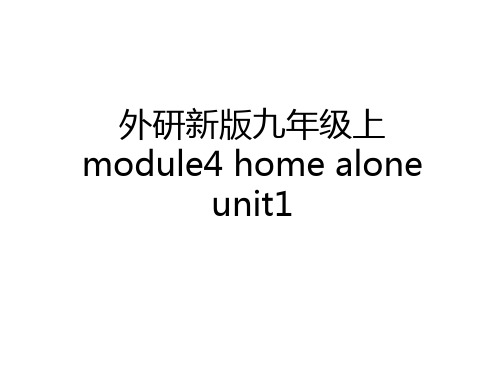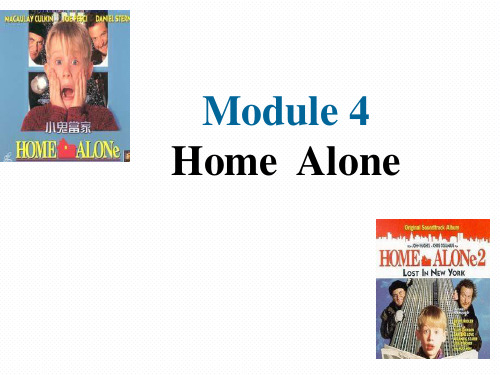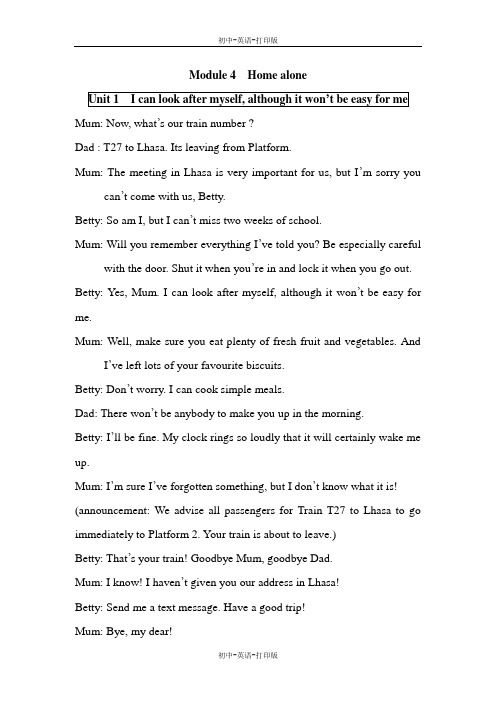九年级英语外研版上册Module4HomealoneModule4Unit1教案
- 格式:doc
- 大小:61.50 KB
- 文档页数:11


Module4Home alone unit1 教案2023-2024学年外研版英语九年级上册外研版九年级上册Module 4 unit1 I can look after myself, although it won't be easy for me.教案Objectives:To introduce and discuss the concept of independence and self-care skills. To develop students’ reading, listening, and speaking skills through comprehension and discussion activities.To enhance students’ vocabulary related to self-care and daily life skills. To encourage students to analyze challenges and develop strategies for self-care.Materials:Textbook: New Standard English (Foreign Language Teaching and Research Press) - Grade 9, Module 4, Unit 1.Whiteboard or blackboard and appropriate markers/chalk.Handouts with reading passages and comprehension questions. Pictures or visuals illustrating self-care activities.Procedure:Warm-upBegin the class by having a brief discussion on the concept of independence and self-care.Ask students to share examples of self-care activities they do on a daily basis.Engage the students in a short conversation about the challenges they might face in taking care of themselves.Vocabulary BuildingIntroduce key vocabulary words related to self-care and daily life skills, such as “responsibility,” “hygiene,” “nutrition,” “time management,” and “problem-solving.”Provide definitions, example sentences, and encourage students to use the words in context.Engage the class in a discussion about the importance of these skills in maintaining a healthy and independent lifestyle.Reading Activity - Personal ChallengesProvide each student with a reading passage about personal challenges faced by individuals in taking care of themselves.Instruct students to read the passage silently and underline any unfamiliar words or phrases.Discuss the passage as a class, clarifying the meaning of the underlined words and confirming comprehension.Listening Activity - Strategies for Self-CarePlay an audio recording or read out a short passage about strategies individuals can adopt to overcome challenges in self-care.Instruct students to listen carefully and take notes on key information. Conduct a class discussion based on the listening activity, prompting students to share their thoughts on effective strategies for self-care. Comprehension QuestionsProvide each student with a handout containing comprehension questions based on the reading and listening activities.Instruct students to answer the questions individually or in pairs. Discuss the answers as a class, allowing students to share and compare their responses.Group Discussion - Personal Challenges and SolutionsDivide the class into small groups.Instruct each group to discuss personal challenges they face in self-care and brainstorm possible solutions or strategies.Encourage students to share their experiences and support each other in finding practical solutions.Facilitate a whole-class discussion summarizing the main challenges and solutions raised by each group.Writing Activity - Personal Action PlanInstruct each student to write a personal action plan for improving their self-care skills.Encourage students to identify specific areas they want to work on and outline steps they can take to enhance their independence andwell-being.Collect and review the students’ action plans, providing feedback and guidance.Conclusion and Wrap-upSummarize the main points covered in the lesson, emphasizing the importance of self-care skills for personal well-being and independence. Address any remaining questions or concerns from the students. Assign the following homework: Write a reflection paragraph on their progress in practicing self-care skills and any challenges they encountered.。

Module 4 Unit1Home alone一、教学内容:I can look after myself, although it won’t be easy for me.二、课型:Listening and speaking三、教学目标:1、能正确运用词汇:platform, anybody, miss, passenger, couple, happily, shut, address, a couple of, text message, lock, ourselves.2、掌握重点句型:(1)I can look after myself, although it won’t be easy for me.(2) My clock rings so loudly that it will certainly wake me up.(3) So am I , but I can’t miss two weeks of school.(4)Your train is about to leave.3 、初步学习结果状语从句。
4、能听懂和阅读关于介绍单独在家经历的语言材料。
5、能通过相关词汇和图片描述自己和他人单独在家的经历;能编写关于独自在家的对话。
四、教学重难点:1、能听懂和阅读关于介绍单独在家经历的语言材料。
2、能运用所学的知识介绍自己单独在家的经历。
五、教学准备:本次课堂为听说课,主要采用互动式教学法,创设真实语境,通过个人呈现,同伴互动,小组活动等师生、生生的交流,充分体现了学生在学习过程中的主体地位,教师只是课堂的引导者,组织者和合作者,让学生在使用中学会英语,综合培养学生的英语语言运用能力。
在教学过程中,采用多媒体手段辅助教学,利用各种图片和习题任务贯穿整个教学过程。
因此,本节课需准备:PPT课件、录音机、课堂练习、奖品。
六、预习要求:1、根据音标自学本课新单词;2、查找相关资料,找出你认为本课较重要的语言点和短语。



Module 4 Home aloneMum: Now, what’s our train number ?Dad : T27 to Lhasa. Its leaving from Platform.Mum: The meeting in Lhasa is very important for us, but I’m sorry you can’t come with us, Betty.Betty: So am I, but I can’t miss two weeks of school.Mum: Will you remember everything I’ve told you? Be especially careful with the door. Shut it when you’re in and lock it when you go out. Betty: Yes, Mum. I can look after myself, although it won’t be easy for me.Mum: Well, make sure you eat plenty of fresh fruit and vegetables. And I’ve left lots of your favourite biscuits.Betty: Don’t worry. I can cook simple meals.Dad: There won’t be anybody to make you up in the morning.Betty: I’ll be fine. My clock rings so loudly that it will certainly wake me up.Mum: I’m sure I’ve forgotten something, but I don’t know what it is! (announcement: We advise all passengers for Train T27 to Lhasa to go immediately to Platform 2. Your train is about to leave.)Betty: That’s your train! Goodbye Mum, goodbye Dad.Mum: I know! I haven’t given you our address in Lhasa!Betty: Send me a text message. Have a good trip!Mum: Bye, my dear!Betty: Bye! See you in a couple of weeks!Now complete the sentences. There may be more than one answer.1.Betty’ parents are going to _______________________.2.Her parents tell her to_________________________________________.3.Betty can ____________________________.4.Betty’s parents usually ________________________________.5.Betty’s mum has not ________________________________. Choose the correct answer.Address, couple, lock, meeting, passenger, ring, shut, text, message 1.“ I haven’t given you our address in Lhasa!”This means you do not know where we are staying/ what we are doing.2.“ A couple of weeks” means several/ two weeks.3.You see passengers traveling by train /staying at home.4.When your clock rings, it is quiet / makes a loud noise.5.A text message is a letter/ message sent with your mobile phone.6.When the door is shut, it is open/ closed.7.When you lock the door, you keep people out / let people in.8.At a meeting, you meet people for work/ fun.。
Module 4 Unit 11. look after照顾= take care oflook after well = take good care of2. train number 车次3. be leaving 现在进行时表将来(类似come, start , go 等)4. Platform Two 二站台(注意首字母大写)5. be important for sb 对某人很重要It’s important for sb to do sth对于某人来说做某事很重要6. ① So + be / 助动词/ 情态动词+ 主语.... 也是(前文为肯定情况)--- I like apples. ---- So does Tony. Tony 也喜欢苹果。
②So + 主语+ be / 助动词/ 情态动词的确如此(同意上述观点)--- I like apples. --- So you do. 你确实喜欢苹果。
③ Neither / Nor + be / 助动词/ 情态动词+ 主语.... 也不(前文为否定情况)--- I don’t like bananas. --- Neither / Nor does Tony. Tony 也不喜欢香蕉。
7. miss two weeks of school 缺席两周的课8. Will you remember everything (that) I’ve told you? 你能记得我告诉过你的所有事情吗?划线部分为定语从句,修饰everything。
其中定语从句省略了关系代词that9 .be careful with /of小心(对待).......10. make sure确保11. plenty of + 可数名词/ 不可数名词许多,大量12. cook simple meals 做简单的饭菜13. wake up醒;醒来(动副短语)14. There won’t be anybody to wake you up in the morning. 早晨没有人会叫你起床。
外研版九(上)Module 4 Home alone知识点详解Uni t 1 I can look after myself, although it won’t be easy for me★(A2).【知识点再现】It’s leaving from Platform 2. 从2号站台出发。
【知识点1】be leaving在这是现在进行时表将来时意义。
在英语中,可以用现在进行时表将来的动词一般都是一些表示位置转移的动词,如come, leave, go, fly, move, start等。
用现在进行时表将来指的是近期的、按计划和安排要发生的动作。
如:Are they all coming tomorrow? 他们明天都来吗?Annie is coming for supper this evening. 今晚安妮要来吃晚餐。
★(A2).【知识点再现】So am I, but I can’t miss two weeks of school. 我也是(很遗憾),但是我不能两周不上课。
【知识点2】So am I意为“我也是”,so代替上文提到的情况。
“So+be动词/助动词/情态动词+主语”表示自己与前一个人的情况相同或同意前一个人的说法,意思是“某人(主语)也是如此”。
be动词/助动词/情态动词要与前面句子的谓语在形式、时态上保持一致,与本句主语在人称和数上保持一致。
如:He can swim, and so can I. 他会游泳,我也会。
Joe was a little upset, and so was I. 乔有点不开心,我也有点儿。
He has been ill, and so has his wife. 他一直生着病,他妻子也一样。
【辨析】“so+ be动词/助动词/情态动词+主语”与“so+主语+ be动词/助动词/情态动词”的用法辨析:①“so+be动词/助动词/情态动词+主语”表示前面所述肯定情况同样适用于后者,意为“某人(主语)也是如此”,前后两句的主语不是同一人。
Module 4 Home aloneUnit 1 I can look after myself,although it won’t be easy for me.(听说课教案)Ⅰ、Teaching model:Listening and speakingⅡ、Teaching method:Communicative approachⅢ、Teaching Objectives●Knowledge objectiveKey vocabulary:----platform,meeting,miss,shut,lock,simple,anybody,clock,ring,passenger,address, test,test message,couple,a couple ofKey structures:-----although和so...that...引导的状语从句。
●Ability objective1. To listen and understand sentences with although and so...that....2. To understand the conversation.3. To learn to use although and so ...that....●Moral objective1. To talk about things staying at home alone..2.. To develop the ability to cooperate with others.Ⅳ、Teaching importance and difficulty1. To learn about some expressions in the passage.2. To learn to use although and so ...that...V、Teaching methodPWP method, task-based methodVI、Teaching aidsA tape recorder, multimedia and some picturesⅦ、Teaching ProceduresLearning Aims (学习目标)1. To listen and understand the conversation with although and so...that...2. To learn to use the patterns with although and so ... that...correctly:I can look after myself , although it won’t be easy for me.My clock rings so loudly that it will certainly wake me up.3. To talk about someone’s feelings with although and so...that...4. To remember the words and expressions(师傅学友明确学习任务)Step 1: Check the new words . (学习单词)1.师友朗读platform meeting miss shut lock simple anybody clock ring passenger address test test message couple, a couple of(师傅注意学友的发音)2.教师检查Task1:请快速说出你看到的单词(师友举手抢答)Step 2: Talk and learn.(学习对话)I.师友听读感知1)Work in pairs Talk about the picture..2)Listen and answer the questions.1.Where are Betty and her parents?2.Is Betty traveling with her parents?2)Listen again and complete the sentences.1.Will you be OK at home________?2.I’ll ________ you too, and I’ll call you every day.3.I’ll keep it tidy so that you’ll _________me when you get home .(先自主完成再互助交流)3)Listen and read again and find out Everyday English1.Now…2.I’m sorry...3.So am I.4.Have a good trip!( 1)学友自主在课文中找到每日英语原句勾画出来。
Module 4 Unit1Home alone
一、教学内容:I can look after myself, although it won’t be easy for me.
二、课型:Listening and speaking
三、教学目标:
1、能正确运用词汇:platform, anybody, miss, passenger, couple, happily, shut, address, a couple of, text message, lock, ourselves.
2、掌握重点句型:
(1)I can look after myself, although it won’t be easy for me.
(2) My clock rings so loudly that it will certainly wake me up.
(3) So am I , but I can’t miss two weeks of school.
(4)Your train is about to leave.
3 、初步学习结果状语从句。
4、能听懂和阅读关于介绍单独在家经历的语言材料。
5、能通过相关词汇和图片描述自己和他人单独在家的经历;能编写关于独自在家的对话。
四、教学重难点:
1、能听懂和阅读关于介绍单独在家经历的语言材料。
2、能运用所学的知识介绍自己单独在家的经历。
五、教学准备:
本次课堂为听说课,主要采用互动式教学法,创设真实语境,通过个人呈现,同伴互动,小组活动等师生、生生的交流,充分体现了
学生在学习过程中的主体地位,教师只是课堂的引导者,组织者和合作者,让学生在使用中学会英语,综合培养学生的英语语言运用能力。
在教学过程中,采用多媒体手段辅助教学,利用各种图片和习题任务贯穿整个教学过程。
因此,本节课需准备:PPT课件、录音机、课堂练习、奖品。
六、预习要求:
1、根据音标自学本课新单词;
2、查找相关资料,找出你认为本课较重要的语言点和短语。
达标训练题
I. 从方框内选择合适的词填空。
shut text meeting address simple
1. At our first __________ I was nervous.
2. Philip went into his room and _______ the door behind him.
3. Read the ________ carefully and then answer the questions.
4. The life in the countryside is _______, but enjoyable.
5. I’ll give you my ________ and telephone number.
II. 单项填空。
1. Don’t worry. She can look after your pet dog_____.
A. careful enough
B. enough careful
C. carefully enough
D. enough carefully
2. Look out! The traffic is____ fast___ we can’t cross the street now.
A. too; to
B. enough; to
C. so; that
D. such; that
3. -- Wow, so many new houses! I can’t believe that. It was a poor villag e five years ago.
-- Yes. ____ has changed here.
A. Nothing
B. Something
C. Everything
D. Anything
4. -- We’d like to go on a picnic this Sunday! -- _____. It’s a good idea.
A. So I had
B. So I would
C. So had I
D. So would I
5. If you want to finish it successfully, you must do it____.
A. carelessly
B. lonely
C. properly
D. usefully。